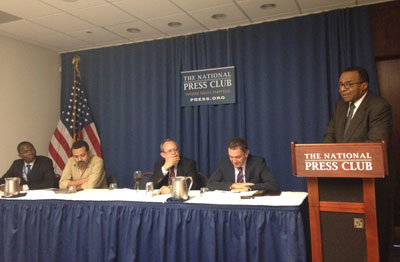Top African and U.S. leaders are meeting next week in Washington in a first-of-its-kind summit focused on African development. But critics argue the summit is flawed in design, overlooking human rights such as freedom of expression and barring civil society actors from bilateral discussions.
“Civil society both in Africa and around the world are crucial to allow people to participate in the governance of their own countries,” Santiago Canton, the director of the RFK Partners for Human Rights, said at a panel Wednesday organized by the Robert F. Kennedy Center for Justice and Human Rights in partnership with the Committee to Protect Journalists. “There’s not enough presence” of civil society at the talks.
Following public advocacy by the We Are Africa campaign about the lack of inclusion at the U.S.-Africa Leaders Summit, the White House added a “Civil Society Forum” on August 4, the first day of the summit, according to Jeffrey Smith, Africa advocacy officer at RFK Partners for Human Rights. This event will “bring together U.S. and African government leaders, members of African and U.S. civil society and the diaspora, and private sector leaders,” according to the conference program. But some argue that those measures fall short of including civil society as equal partners in the official meetings on August 5 and 6, “where critical topics will be discussed between U.S. government and African leaders,” according to we-are-africa.org, an advocacy website hosted by Front Line Defenders.
The right to freedom of expression in Africa is of particular concern. Last week, a court in Swaziland convicted an editor to two years in prison for articles in his magazine criticizing the kingdom’s chief justice. In mid-July, Ethiopia charged 10 journalists (one in absentia) under the country’s overly broad anti-terrorism law, and an Ethiopian photojournalist who was covering protests has been held without charge for the last two weeks. In Egypt, three Al-Jazeera journalists were recently sentenced to between seven and 10 years in prison.
Such measures create an environment in which economic development and government decisions cannot be effectively reported and monitored.
“Human rights violations occur when there is no information, when the situation is invisible and you don’t see the violations,” Canton said.
Almost all African countries have ratified most of the U.N. treaties pertaining to press freedom, but enforcement is missing, said Arthur Gwagwa, advocacy coordinator at Zimbabwe Human Rights NGO Forum.
Western countries should “tie trade and technical assistance to how the countries are performing,” Gwagwa said. “Throwing money at dictators doesn’t help.”
To note, the U.S. administration excluded Zimbabwe’s Robert Mugabe, Sudan’s Omar al-Bashir and Eritrea’s Isaias Afwerki from the talks. But other leaders that have been in power for more than two decades were invited and plan to attend, including Eduardo dos Santos of Angola, Paul Biya of Cameroon, Teodoro Obiang of Equatorial Guinea, Denis Sassou N’Guesso of the Republic of the Congo, Yahya Jammeh of Gambia, and Yoweri Museveni of Uganda, according to Smith and Todd Moss, a senior fellow at the Center for Global Development.
Nor will human rights be on the agenda at the summit: organizers feared such African leaders might not otherwise attend, Canton said. Omitting human rights deprives participants of talks on a crucial element for economic development, he said.
Lack of access to online content for many Africans is also problematic, said Frank La Rue, outgoing U.N. special rapporteur on the promotion and protection of the right to freedom of opinion and expression. African countries should provide access to online content for free through libraries and Internet centers, he said. The U.N. also needs to invest more money in enforcing and monitoring freedom of expression rights, he said, adding that his office is severely understaffed.
Advocates from the We Are Africa campaign made a series of recommendations for U.S. and African leaders, including ensuring anti-terrorism assistance does not willfully impinge on the rights of citizens. African leaders should comply with and enforce mutually agreed upon rulings from local, regional, and continental courts, advocates said. A full list of the recommendations can be found here.
